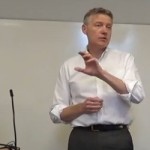British Pugwash Discussion Meeting, Wednesday 1 July 2015 17.30-19.00. Speakers: Richard Guthrie and Dr Caitriona McLeish, Ramsay Lecture Theatre, Christopher Ingold Chemistry Building, University College London. Details: The Use of Chemical Weapons in Syria Event Flyer (PDF A4)

What happened to Trident?
The 11th annual Rotblat Lecture at the Hay Festival was given this year on 30 May by the distinguished journalist and broadcaster Jon Snow, who asked ‘What happened to Trident?’

Western responses to Russian activities in Ukraine
Events in Ukraine have contributed to the gravest crisis in Russia-West relations since the end of the Cold War. Dr Ian Kearns Director of the European Leadership Network, explores what has gone wrong, how the West has responded and what it should do next to both resist Russian behaviour and set relations on a more […]
Mapping Disarmament in the UK
In response to a high level request for an overview of UK non-governmental work on nuclear disarmament, British Pugwash has produced a directory of the UK-based NGOs and individual experts that have a focus on the non-proliferation and disarmament of nuclear, chemical and biological weapons.
Advancing UK and European leadership in nuclear non-proliferation and disarmament
This project aimed to promote European dialogue for progress in the May 2010 NPT Review Conference. It was led by the President of International Pugwash, Amb. Jayantha Dhanapala, who chaired the 1995 Review and Extension Conference of the Nuclear Non-Proliferation Treaty (NPT).
Rotblat Essay Competition
In 2007, British Pugwash launched an annual essay competition in honour of Professor Joseph Rotblat. Closing shortly after the general election in May, the 2010 competition asked what advice should be given to the next Government on a science and technology topic of the entrants’ choosing.
